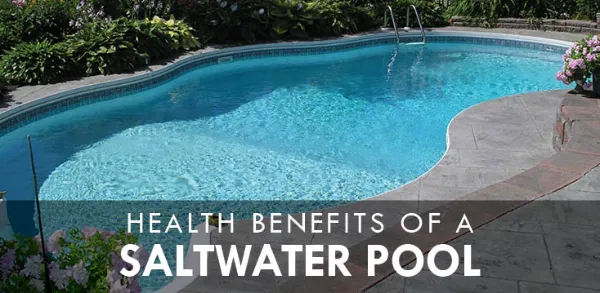The great health benefits of saltwater swimming pools
With today’s cutting-edge, reliable, and secure water treatment technology, chemical-free swimming pools and the health benefits of saltwater swimming pools are the hottest trends. The most popular technique for making saltwater swimming pools is salt electrolysis. To learn more about the advantages of salt water and salt water pools and why so many people desire to experience them, read the article that follows.
Contents
- 1 What are saltwater swimming pools?
- 2 Saltwater swimming pool technology
- 3 Why use a salt electrolysis device?
- 4 The health benefits of saltwater swimming pools
- 5 Necessary standards for saltwater swimming pools
- 6 What kind of technology is needed to run a saltwater pool?
- 7 Notes when operating saltwater pools
What are saltwater swimming pools?
Commonly referred to as saltwater pools, they have a distinctive saline flavor. Modern machinery, with table salt as the primary raw material, allows it to be operated depending on changes in the physical features of the water source (NaCl). Table salt is an environmentally beneficial substance that is found in nature rather frequently and has numerous positive effects on human health.
Saltwater pools use salt electrolysis technology to eliminate chemical residues left behind by conventional procedures, in contrast to other types of swimming pools that treat water with standard filtration and chemical filling systems. Not only that, but contemporary technology also contributes to keeping swimming-safe water at its best.
There are currently a number of studies demonstrating the various unique advantages sea swimming has for the human body. The temperature rises to 37 degrees Celsius because they have a lot of healthy minerals in them. The water will evaporate at this perfect temperature, washing away all the microorganisms on the skin’s surface and removing any excess fat or sloughed stratum corneum. As a result, the minerals penetrate the skin considerably more quickly and easily.
As a result, saltwater swimming pools were developed and established as the best way to address the growing need for health care. Additionally, without really leaving the pool, people can benefit from all the cozy and soothing sensations of the sea. For towns without a sea, like Hanoi or Ho Chi Minh City, this swimming pool is ideal.
Saltwater swimming pool technology
Saltwater pool technology requires salt electrolysis equipment in order to maintain the salinity and clean chlorine content converted in the pool water, saltwater pool technology requires salt electrolysis equipment. The premise behind salt electrolysis machines, which are researched and produced at a cutting-edge technological level, is to use electrode rods to produce chlorine from sodium chloride salt.
A specific amount of chlorine is released during the electrolysis of sodium chloride; this chlorine, when combined with water, produces a combination of two acids. The strong oxidizing capabilities of HClO in particular make it ideal for use in swimming pool disinfection and cleaning. This approach is thought to totally replace traditional chemicals used in manual water treatment.
Why use a salt electrolysis device?
A saltwater pool can be created using a salt electrolysis machine, which has numerous remarkable benefits, including:
- Conveniently, the process of providing pure chlorine is continuously happening to help maintain the water quality at an optimal level.
- There is no need to use or keep harsh industrial cleaning agents that can irritate the skin and eyes.
- Simple manufacturing using readily available, inexpensive natural salt components.
- You won’t notice a salty flavor or smell in the lake’s water because the salt content there is fairly low.
- Time and effort are saved by an automatic and clever sterilization procedure.
- Installing and using the device is an easy and quick process.
The health benefits of saltwater swimming pools

People may immediately perceive the remarkable health benefits of saltwater swimming pools when using them. I must specifically name a few of them:
- Improved blood circulation
- Repel stress, stabilize heart rate in the body
- Strengthen resistance
- Helps skin to be healthy, shiny, smooth, and rejuvenated
- No irritation because there is no need to use chlorine to disinfect the tank.
- It prevents the formation of chloramines and helps the body develop better.
Because counterfeit table salt is significantly less expensive than chlorine, it is easier to purchase, and people are less likely to be alarmed by false and subpar goods. As a result, this kind of tank requires a significantly smaller initial expenditure.
Additionally, the health benefits of saltwater swimming pools include that using saltwater pools makes people’s minds more at ease and helps them experience fewer joint pains. Additionally, people’s insomnia vanished, and skin conditions were also addressed in a very subdued manner.
Because of possessing many great health benefits, salt water swimming pools are currently the number one choice of many family swimming pools, hotels, luxury resorts, etc.
Necessary standards for saltwater swimming pools
The composition and operation of swimming pools utilizing saltwater will differ from those using traditional chemicals, so there are many aspects of the operation that require attention. The concentration of compounds must be kept within the accepted threshold in order to produce the optimal health benefits, namely:
- Salinity (salt concentration) 2500 ppm – 4500 ppm
- Standard pH 7.2 – 7.8
- Total alkalinity 80-120ppm
- Chlorine concentration 1-3ppm
- Cyanuric acid concentration 50 – 80ppm
- The temperature of the water
Since salt water pools do not treat their water with chemicals, they need to be regularly inspected and maintained.
What kind of technology is needed to run a saltwater pool?
Swimming pools near the sea
The construction of the tank is made significantly easier by the project’s proximity to the ocean because the construction will be using a 10 m deep seawater drainage system into the pool at that time. But in order to produce a source of water that is totally safe for people, sea water needs to be completely cleaned of hazardous bacteria before this water source is built.
Experts believe that this is high-tech, modern, and meets all standards while being completely safe for human health. The high operational costs, complicated operating technology, and high investment costs, however, are a challenge for everyone in this situation.
Swimming pools far from the sea
It may be argued that people today need to employ salt electrolysis technology to be able to dissolve table salt and supply water continuously in order to operate a saltwater swimming pool smoothly and in the most appropriate manner.
Water from a pool won’t often taste like anything. To maintain salinity and convert chlorine levels in the pool, this technology will cause the water to be slightly salty. After that, make sure everyone uses the pool as effectively as possible.
Notes when operating saltwater pools
People must frequently inspect and maintain the saltwater swimming pool to prevent damage to the operational equipment so that it may be used successfully.
Check and maintain pH

In saltwater swimming pools, the typical pH ranges from 7.2 to 7.8. People must therefore routinely check for maintenance and find a solution if the pH is too low or too high. Because the presence of chlorine is essential for removing bacteria from pool water and preventing the development of moss and algae.
Regularly check the salt concentration and salinity.
The main pool’s typical standard, usable salt concentration ranges from 2500 to 4500 ppm. As a result, consumers must perform weekly saline test kits. Additionally, this inspection aids customers in quickly determining and ensuring that the pool’s salinity is consistent, enabling the pool to meet the highest requirements. Additionally, users must identify salinity changes early to develop the appropriate adjustment strategy in the event that they exceed or fall below the predetermined threshold.
Analyze and keep track of alkalinity.
Another essential element for maintaining pH stability is alkalinity. As a result, the items in the swimming pool will corrode when the alkalinity is low. Additionally, high alkalinity makes water acidic, which alters the pH in the tank.
The most stable alkalinity is thought to be between 110 and 120 ppm, experts’ guidelines state.
Check the level of chlorine in the water.

The water’s chlorine concentration should typically be kept between 1 and 3 ppm. In order to make the timely modifications required when the chlorine level varies, people must therefore undertake tests 4–8 times each week.
Check the level of cyanuric acid.
Cyanuric acid serves as a stabilizer in saltwater pools. This substance is very significant since it aids in preventing chlorine loss from sunshine or water precipitation. It is crucial to be checked frequently to ensure that your cyanuric acid levels stay within the 50–80 ppm range.
Check water temperature
One of the health benefits of saltwater swimming pools that people need to be aware of is the temperature of saltwater swimming pools. According to the study, because cold water is not compatible with water disinfectants, as a result, chlorine has a lot stronger ability to function in the summer when the temperature is high. Checking the swimming pool’s water temperature is so crucial.
In order for the tank to function optimally, individuals also need to pay attention to things like balancing the water, making sure the filtering process is optimized, etc.
The details and the health benefits of saltwater swimming pools that I want to share with everyone are listed above. As a result of this post, investors will have a different perspective on saltwater swimming pools and will be able to make the best decision for their projects as a result of this post.
You are interested:
https://listtravels.com/these-beautiful-mud-bricks-buildings-in-the-world.html



